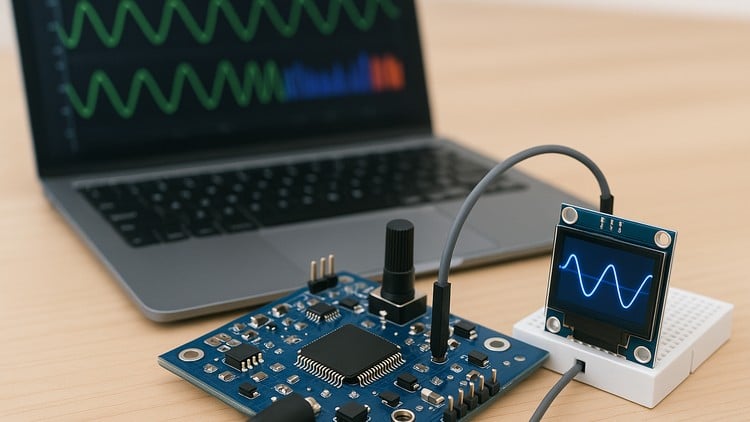
Build real-time DSP solutions for embedded systems with real-time filtering, FFT, optimization and hardware acceleration
What you will learn
Understand the core principles of digital signal processing (DSP)
Apply sampling, quantization, and time-domain analysis techniques
Design and implement FIR and IIR filters for embedded systems
Use FFT, adaptive filtering, and hardware acceleration in real-time applications
Optimize DSP algorithms using fixed-point techniques
Add-On Information:
Note➛ Make sure your 𝐔𝐝𝐞𝐦𝐲 cart has only this course you're going to enroll it now, Remove all other courses from the 𝐔𝐝𝐞𝐦𝐲 cart before Enrolling!
- Master the art of transforming raw sensor data into meaningful insights by delving into the foundational concepts of digital signal manipulation specifically tailored for resource-constrained environments.
- Develop a practical toolkit for real-time data processing, equipping you with the ability to process signals as they arrive, crucial for applications demanding immediate responsiveness.
- Gain proficiency in translating theoretical DSP knowledge into tangible embedded solutions, bridging the gap between academic understanding and practical implementation.
- Explore the nuances of efficient signal analysis, enabling you to extract critical information from noisy or complex signals within the limitations of embedded hardware.
- Learn to select and implement appropriate digital filtering techniques that effectively remove unwanted noise and extract desired signal components, enhancing the accuracy and performance of your embedded systems.
- Unlock the power of spectral analysis through the practical application of Fast Fourier Transforms (FFT) to understand the frequency content of signals and its implications in embedded contexts.
- Discover advanced DSP techniques like adaptive filtering, allowing your systems to dynamically adjust to changing signal characteristics and environmental conditions.
- Navigate the complexities of hardware acceleration, learning how to leverage specialized hardware components to significantly boost the processing speed and efficiency of your DSP algorithms.
- Become adept at optimizing DSP algorithms for embedded processors, focusing on techniques that minimize computational load and memory footprint without sacrificing accuracy.
- Understand the critical trade-offs between precision and performance when implementing DSP algorithms using fixed-point arithmetic, a common requirement in embedded development.
- Build a portfolio of real-world DSP applications, demonstrating your ability to tackle diverse embedded signal processing challenges.
- Acquire the skills to debug and validate complex DSP implementations within the context of embedded systems, ensuring reliability and robustness.
- Gain insights into the entire DSP development lifecycle, from initial signal characterization and algorithm design to deployment and performance tuning on embedded platforms.
- PROS:
- Highly practical and hands-on, focusing on immediate applicability in real-world embedded projects.
- Develops essential skills for the burgeoning IoT and embedded systems market, making you a more competitive candidate.
- Empowers you to create intelligent and responsive embedded devices by mastering signal interpretation and manipulation.
- CONS:
- Requires a foundational understanding of basic signal processing concepts and embedded systems programming to maximize learning.
English
language